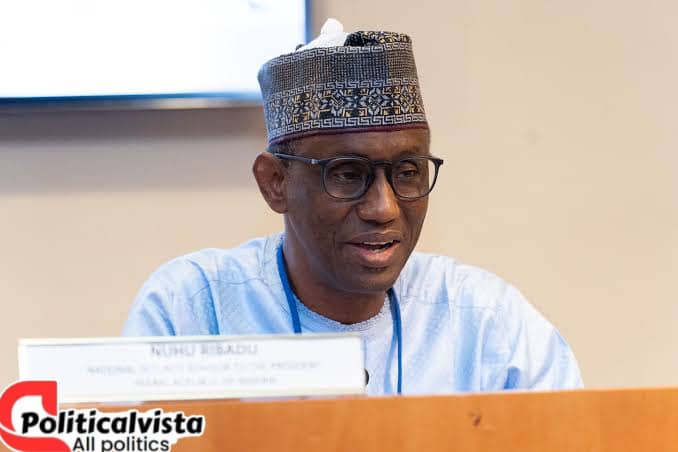
Nuhu Ribadu, Nigeria’s National Security Adviser, has called for a coordinated efforts to tackle poverty and hunger, stressing the need for a unified approach to address them as key drivers of insecurity in Nigeria.
In a keynote address at the National Defence College seminar, Ribadu, represented by Major General Peter Mala,
highlighted the importance of agricultural reforms and social investment programs in achieving sustainable peace and development.
As he stated, “Hunger and poverty are not merely social concerns; they are catalysts for insecurity, crime, violence, and social disintegration. These issues form a vicious cycle — poverty leads to insecurity, and insecurity, in turn, deepens poverty.”
According to Ribadu, President Bola Tinubu’s administration is tackling the issue through a multi-faceted approach, focusing on agricultural reforms, social investments, and security enhancements.
These efforts encompass initiatives like food security support, improved law enforcement, and infrastructure upgrades to enhance agricultural productivity and distribution.
In his words: “the Office of the NSA is working to integrate military, intelligence, and civil efforts to address the security challenges, utilizing both conventional and unconventional strategies.
“Despite progress, challenges like unemployment, hunger, and youth disenfranchisement persist and require deeper, long-term solutions,” he remarked.
General Christopher Musa emphasized the critical link between poverty, hunger, and national security, calling for a collective effort to address these challenges, noting that:
“Insecurity today is not only defined by weapons but also by economic deprivation, food insecurity, and social dislocation.
“The North Central region, particularly Benue State, once known as Nigeria’s food basket, has been devastated by banditry, displacement, and farmer-herder conflicts.”
He cautioned that the interference with farming, illegal occupation of agricultural land, and rural-urban migration are contributing to rising food costs, mass displacement, and instability across the country.
General Musa emphasized the need for immediate investment in local agriculture, focusing on improved access to financing, infrastructure development, and market access, to make farming a viable and esteemed profession.
“With the migration of rural youths to urban centres, agricultural productivity is declining. We must make farming attractive again—not as a last resort, but as a national duty and a prestigious calling,” he said.
The Minister of Defence, Alhaji Muhammed Badaru, emphasized the need for a people-centered approach to security, addressing root causes like poverty, unemployment, and social marginalization.
Commending the courage and ingenuity of Nigeria’s Armed Forces in tackling ongoing security problems, he said;
“In a world where security threats know no borders, collective action is needed.”
Also speaking at the occasion, the AANDEC President, Air Commodore Darlington Abdullahi described hunger and poverty as major strategic threats to national stability, stressing the importance of sustained investments in education, economic opportunities, and social inclusion to combat insecurity.
“When millions suffer from hunger and poverty, they become vulnerable to exploitation by those with ill intentions.”
“We must invest in our people, especially in education, livelihoods, and skills development,” he said.

Be the first to comment